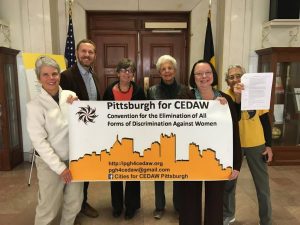1. What is CEDAW and what does it mean?
3. Why does Pittsburgh need CEDAW legislation?
4. Does CEDAW really make a difference?
5. What’s next for Cities for CEDAW Pittsburgh?
What is CEDAW and what does it mean?
The Convention on the Elimination of all forms of Discrimination Against Women or CEDAW for short is an international treaty adopted by the United Nations in 1979. By 1982, 189 countries had signed and ratified CEDAW. The United States signed the treaty, but has yet to ratify it.
The CEDAW treaty consists of six parts with a total of 30 articles and is similar to the Convention on the Elimination of All Forms of Racial Discrimination. The first four parts of the treaty focus on:
- Non-discrimination, sex stereotypes, and sex trafficking
- Women’s rights in the public sphere including political life, representation, and nationality rights
- Economic and social rights of women with a particular focus on education, employment and health
- Women’s right to equality in marriage, family, and equality before the law
Sections five and six establish the Committee on the Elimination of Discrimination against Women, their reporting requirements, and accountability for the participating states. As the only international treaty focused on women’s rights with a clear definition of discrimination against women, CEDAW is an essential step towards equality.
What is Cities for CEDAW?
Because the US has yet to ratify the treaty, the Cities for CEDAW campaign works to “Make the Global Local” by bringing CEDAW legislation to you and your city. The campaign focuses on establishing CEDAW legislation at the city level and protecting the rights of women and girls locally.
Launched in 2013 by the NGO Committee on the Status of Women (CSW), Cities for CEDAW is a grassroots campaign that provides the resources needed to empower and initiate local campaigns.
Why does Pittsburgh need CEDAW legislation?
Every city needs CEDAW legislation. In Pennsylvania, women earn less than men, suffer from domestic violence, and are underrepresented in political positions.
- 60% of minimum wage earners in Pennsylvania are women
- Cost of infant care in PA accounts for 27% of women’s median annual earnings
- Black girls are suspended from school at higher rates (13%) than girls of any other race or ethnicity and most boys
- Pennsylvania has never elected a woman governor or state senator
- In 2019, only 63 out of 253 seats (24.9%) are occupied by women in Pennsylvania’s Legislature, still below the national average of 28.7%
Pittsburgh is not immune to the gender discrimination pervasive throughout the state. In Allegheny County alone, 4,000 Protection from Abuse orders are issued annually. 77% of poor households in Allegheny County are run by single mothers (Femisphere). Among Pittsburgh city employees, 77% are male and only 23% are female, which contributes to the gender wage gap (PublicSource).
Does CEDAW really make a difference?
CEDAW has already proven effective in the fight to eliminate discrimination against women in the countries where the treaty was ratified. In 22 countries with CEDAW ratification, policies and laws have been enacted to promote women’s equal opportunity in employment. The Australian government passed national legislation against sexual harassment in employment after ratifying CEDAW. Germany, Poland, Portugal, Spain, the Philippines, Guatemala and more have improved maternity leave and child care provisions for working women in compliance with CEDAW.
If it can work at a country-wide level, then it can certainly work at the city, town, or county level. San Francisco was the first US city to adopt CEDAW legislation in 1998. Since then, San Francisco has seen a notable difference as they work to comply with the treaty.
After adopting CEDAW, San Francisco:
- Reduced domestic violence and even went 44 months without domestic violence homicides
- Public Works improved street lighting to increase safety
- Created a “girls unit” in the Department of Juvenile Probation to provide gender-specific, trauma-focused services for girls
- Increased female employment in professional jobs within the city
- Established the Gender Equality Principles Initiative to expand gender analysis
You can learn more about San Francisco’s success as a CEDAW city here.
What’s next for Cities for CEDAW Pittsburgh?
In 2016, Pittsburgh became the sixth city in the US to pass CEDAW legislation, but that doesn’t mean our work is done. Currently, Pittsburgh for CEDAW is working to ensure that the ordinance is implemented successfully by assisting the city’s first ever Gender Equity Commission (GEC). The Gender Equity Commission, via the City of Pittsburgh, is contracting with the University of Pittsburgh to conduct a city-wide intersectional gender analysis.
Our goals also include:
- Continue to encourage the Pittsburgh City Council members and the mayor to support CEDAW and the GEC.
- Leverage the information gained from the analysis to make Pittsburgh a more equitable city.
- Engage the public and build awareness for the Gender Equity Commission and the work they are doing.
- Build support for the on-going funding and implementation of the Gender Analysis and its conclusions.
- Assist other organizations as they launch CEDAW campaigns in their cities and towns.
How can I get involved?
Getting involved is easy! Come join us at the 5th Annual Human Rights Potluck on Sunday, August 25 in Mellon Park. The potluck, co-hosted by the Pittsburgh Human Rights City Alliance, Pittsburgh for CEDAW Coalition, and other human rights organizations, is a great way to meet the women behind Cities for CEDAW Pittsburgh and learn more about our mission.
If you’re unable to attend the potluck, you can always contact us or sign up for our newsletter. We look forward to hearing from you!
